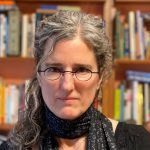Steven Weinberg, Nobel laureate in physics and Bulletin board member, dies at 88
By Susan D’Agostino | July 27, 2021
 Physicist Steven Weinberg, January 28, 2008. Credit: Larry Murphy, The University of Texas at Austin. Used with permission.
Physicist Steven Weinberg, January 28, 2008. Credit: Larry Murphy, The University of Texas at Austin. Used with permission.
“Whatever the final laws of nature may be, there is no reason to suppose that they are designed to make physicists happy,” renowned theoretical physicist Steven Weinberg once wrote. Despite this assessment, Weinberg, who passed away last week at the age of 88, appears to have been a physicist who lived a happy—or at least deeply meaningful—life.
Weinberg’s cousin gave him an old chemistry set that sparked his love of science from an early age. He was the first in his family to attend college and earned a bachelor’s degree at Cornell University and a doctorate in physics at Princeton. He was captivated by the question of whether the four known forces of nature—gravity, electromagnetism, the weak force (responsible for particle decay), and the strong force (responsible for binding fundamental particles of matter together)—were manifestations of a single force of the universe.
His curiosity led him to write a brief (three-page) article, “A Model of Leptons,” published in Physical Review Letters in 1967, that now ranks among the most cited research papers in history. In his paper, he predicted the behavior of particular subatomic particles and helped unify the electromagnetic and weak forces into what is now known as the electroweak force. The work provided a foundation for the Standard Model—a physics theory that describes how known elementary particles in the universe behave. Later, in 1979, together with Sheldon Glashow and Abdus Salam, he was recognized with a Nobel Prize.
Unusual for scientists of his stature, Weinberg worked to ensure that science was not only accessible but enthralling and entertaining to nonexperts. His 1977 book, The First Three Minutes: A Modern View of the Origin of the Universe, described the universe’s evolution within minutes of the Big Bang. “The effort to understand the universe is one of the very few things that lifts human life above the level of farce and gives it some of the grace of a tragedy,” he wrote. He is the author of hundreds of scholarly articles and numerous popular books. He held anyone who was curious about science, including nonexperts, in high regard. “You have to keep in mind that you are writing for people who are not mathematically trained but are just as smart as you are,” he said.
Weinberg also cultivated a longtime commitment to curbing nuclear proliferation, which was evident in his New York Review of Books op-eds, his service as a consultant to the US Arms Control and Disarmament Agency, and his book, Glory and Terror: The Growing Nuclear Danger.
In 2009, Weinberg accepted the Bulletin’s invitation to join our Board of Sponsors, on which he served until his death. The Board of Sponsors was established by Albert Einstein and first chaired by Robert J. Oppenheimer. Board members, who are among the worlds’ most accomplished science and security leaders, are consulted on key issues, including setting the Bulletin’s Doomsday Clock. Today, the board has 30 members, including 12 Nobel laureates.
“Steven Weinberg offered unfailing support to the Bulletin, introducing us to new audiences and speaking out about the importance of nuclear issues for the general public,” Kennette Benedict, former executive director of the Bulletin of the Atomic Scientists, wrote. “With a quick wit and authoritative voice, he waded into controversial matters, engaging other experts and lay audiences alike without fear or favor. We will miss his lively intellect and generous spirit.”
Weinberg’s passing was announced by the University of Texas, where he worked as a physics and astronomy professor for nearly four decades. He is survived by his wife, Louise, a law professor at the University of Texas at Austin, and daughter, Dr. Elizabeth Weinberg.
“Although we are not the stars in a cosmic drama,” he once told PBS, “if the only drama we’re starring in is one that we are making up as we go along, it is not entirely ignoble that faced with this unloving, impersonal universe we make a little island of warmth and love and science and art for ourselves.”
Together, we make the world safer.
The Bulletin elevates expert voices above the noise. But as an independent nonprofit organization, our operations depend on the support of readers like you. Help us continue to deliver quality journalism that holds leaders accountable. Your support of our work at any level is important. In return, we promise our coverage will be understandable, influential, vigilant, solution-oriented, and fair-minded. Together we can make a difference.
Keywords: Board of Sponsors, Nobel Prize, Nobel Prize in physics, Steven Weinberg, physics
Topics: Doomsday Clock, Nuclear Risk, Nuclear Weapons, Opinion, Special Topics
















A Texas gentle giant in the Physics world has passed.